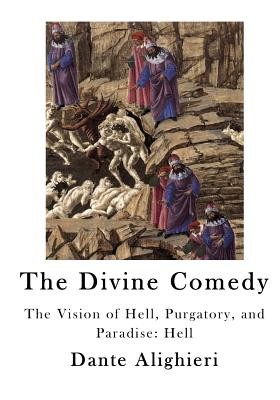
- We will send in 10–14 business days.
- Publisher: CreateSpace Independent Publishing Platform
- Year: 2016
- Pages: 290
- ISBN-10: 1523249218
- ISBN-13: 9781523249213
- Format: 17.8 x 25.4 x 1.6 cm, softcover
- Language: English
- SAVE -10% with code: EXTRA
The Divine Comedy (e-book) (used book) | bookbook.eu
Reviews
Description
The Divine Comedy
The Vision of Hell, Purgatory, and Paradise: Hell
Dante Alighieri
Translated by The Rev. H. F. Cary, M.A.
Illustrated by Gustave Doré
The Divine Comedy (Italian: Divina Commedia is an epic poem by Dante Alighieri, begun c. 1308 and completed 1320, a year before his death in 1321. It is widely considered the preeminent work of Italian literature and is seen as one of the greatest works of world literature. The poem's imaginative vision of the afterlife is representative of the medieval world-view as it had developed in the Western Church by the 14th century. It helped establish the Tuscan language, in which it is written, as the standardized Italian language. It is divided into three parts: Inferno, Purgatorio, and Paradiso.
On the surface, the poem describes Dante's travels through Hell, Purgatory, and Paradise or Heaven; but at a deeper level, it represents, allegorically, the soul's journey towards God. At this deeper level, Dante draws on medieval Christian theology and philosophy, especially Thomistic philosophy and the Summa Theologica of Thomas Aquinas. Consequently, the Divine Comedy has been called "the Summa in verse."
The work was originally simply titled Comedìa and the word Divina was added by Giovanni Boccaccio. The first printed edition to add the word divina to the title was that of the Venetian humanist Lodovico Dolce, published in 1555 by Gabriele Giolito de' Ferrari.
- Publisher: CreateSpace Independent Publishing Platform
- Year: 2016
- Pages: 290
- ISBN-10: 1523249218
- ISBN-13: 9781523249213
- Format: 17.8 x 25.4 x 1.6 cm, softcover
- Language: English English
The Divine Comedy
The Vision of Hell, Purgatory, and Paradise: Hell
Dante Alighieri
Translated by The Rev. H. F. Cary, M.A.
Illustrated by Gustave Doré
The Divine Comedy (Italian: Divina Commedia is an epic poem by Dante Alighieri, begun c. 1308 and completed 1320, a year before his death in 1321. It is widely considered the preeminent work of Italian literature and is seen as one of the greatest works of world literature. The poem's imaginative vision of the afterlife is representative of the medieval world-view as it had developed in the Western Church by the 14th century. It helped establish the Tuscan language, in which it is written, as the standardized Italian language. It is divided into three parts: Inferno, Purgatorio, and Paradiso.
On the surface, the poem describes Dante's travels through Hell, Purgatory, and Paradise or Heaven; but at a deeper level, it represents, allegorically, the soul's journey towards God. At this deeper level, Dante draws on medieval Christian theology and philosophy, especially Thomistic philosophy and the Summa Theologica of Thomas Aquinas. Consequently, the Divine Comedy has been called "the Summa in verse."
The work was originally simply titled Comedìa and the word Divina was added by Giovanni Boccaccio. The first printed edition to add the word divina to the title was that of the Venetian humanist Lodovico Dolce, published in 1555 by Gabriele Giolito de' Ferrari.


Reviews